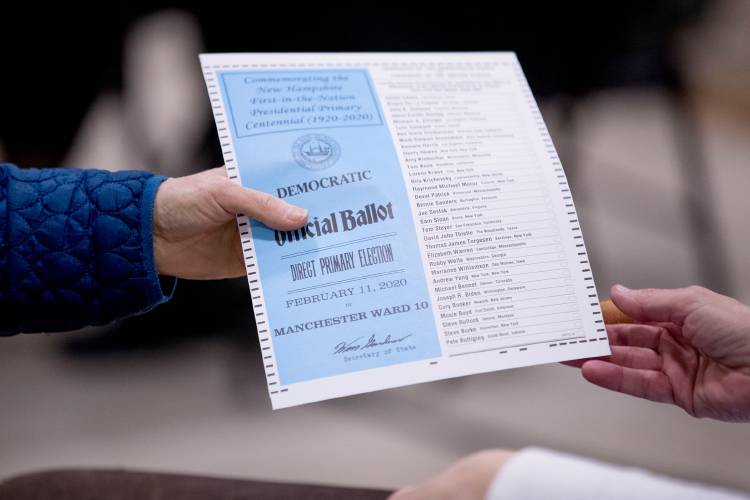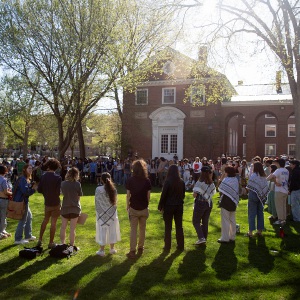Editorial: New Hampshire’s problem with voter suppression

FILE - A woman takes a Democratic ballot to vote in the New Hampshire Primary at Parker-Varney Elementary School, Tuesday, Feb. 11, 2020, in Manchester, N.H. Months after the Democratic Party approved President Joe Biden's plan to overhaul its primary order to better reflect a deeply diverse voter base, implementing the revamped order has proven anything but simple. Party officials now expect the process to continue through the end of the year — even as the 2024 presidential race heats up all around it. (AP Photo/Andrew Harnik, File) Andrew Harnik
|
Published: 01-19-2024 9:30 PM
Modified: 01-22-2024 9:40 AM |
The New Hampshire Attorney General’s Office has ordered the Democratic National Committee to “cease and desist” from calling the state’s upcoming Democratic presidential primary “meaningless,” on the grounds that “falsely” doing so constitutes voter suppression under state law.
It’s hard to know what to make of this far-fetched proposition, given that what constitutes meaninglessness would seem to be an opinion, the expression of which is protected by the First Amendment. Probably, it is just an attempt to defend the New Hampshire “brand” as the first-in-the-nation primary state. But ironically, it also comes at a time when the Attorney General’s Office is defending a recently enacted state law that appears expressly designed to suppress voting among Democrats.
More on that later. First, about that cease and desist order. “Meaningless” is generally taken to mean “having no purpose.” And if the purpose of the Democratic presidential primary is to allocate among presidential candidates the state’s delegates to the national nominating convention, the DNC seems to have a point. None will be awarded based on the state’s primary results.
That’s because New Hampshire declined to adhere to the Democratic Party’s newly adopted schedule of primaries, which elevated South Carolina to the lead spot and relegated New Hampshire to second place, a week later. By going ahead with its first-in-the-nation presidential primary, as mandated by state law, New Hampshire is deemed to be out of compliance and is thus being sanctioned by the Democratic National Committee.
Of course, that doesn’t necessarily mean that the event is meaningless. Although President Biden declined to have his name placed on the ballot in New Hampshire because of its non-compliance with the party’s new calendar, his supporters are mounting a write-in effort on his behalf. The results could provide some measure of his strength as a candidate for a second term, even if most of the attention is rightly focused on Tuesday’s incredibly meaningful Republican presidential contest.
In any case, this spat arises at time when the DNC is itself suing the state over voter suppression.
SB 418, which was enacted in 2022 by the Republican-controlled Legislature, purports to combat voter fraud. It requires anyone who registers to vote on election day without the required documentary proof of identity to submit an “affidavit ballot,” which will be sequestered and excluded from the final count unless that individual complies with a convoluted and cumbersome verification process within seven days. Those who fail to comply within the seven-day window by submitting the required documentation to the Secretary of State are to be referred to the Attorney General’s Office for possible criminal prosecution.
Article continues after...
Yesterday's Most Read Articles
 Dartmouth administration faces fierce criticism over protest arrests
Dartmouth administration faces fierce criticism over protest arrests
 West Lebanon crash
West Lebanon crash
 Plan on track to ship Upper Valley mail to Connecticut for sorting
Plan on track to ship Upper Valley mail to Connecticut for sorting
 Lebanon’s Jewell back from auto accident, more aware of ‘drowsy driving’ dangers
Lebanon’s Jewell back from auto accident, more aware of ‘drowsy driving’ dangers
 Longtime employees buy West Lebanon pizzeria
Longtime employees buy West Lebanon pizzeria
The DNC’s suit, filed last month in Hillsborough Superior Court, argues that the law violates due process rights of New Hampshire voters and does not comply with the New Hampshire Constitution’s mandated timeline for counting votes and reporting them.
The merits of those legal claims will be sorted out by a judge. But the background outlined by the suit is telling. It points out that the state’s previous procedure for same-day registration, which was in effect for nearly 30 years, worked smoothly and resulted in some of the highest voter turnouts in the nation. And it produced little to no evidence of voter fraud. Under the old rules, the suit says, 75,612 votes were cast by same-day registrants in the 2020 general election, and the state has not brought a single voter-fraud prosecution in connection with that election.
The suit also notes that the Legislature rushed to pass the bill despite being told that it was constitutionally suspect. Secretary of State David Scanlan repeatedly urged the Legislature to get an advisory opinion on its constitutionality from the state Supreme Court, which the bill’s supporters declined to do.
So why did the Legislature make it harder to register to vote on the same day? The suit alleges that those most affected by the new documentation regime will be young, low-income and minority voters, as well as students — groups that tend to vote for Democratic candidates. In 2020, precincts with the highest number of same-day registrations voted overwhelmingly for Democratic candidates.
And that’s certainly not meaningless in a battleground state where the 2024 general election is expected to draw a record turnout.

 Editorial: Response to campus protests only adds fuel to the fire
Editorial: Response to campus protests only adds fuel to the fire Editorial: Chris Sununu’s moral vacuum
Editorial: Chris Sununu’s moral vacuum Editorial: Gambling tarnishes America’s sporting life
Editorial: Gambling tarnishes America’s sporting life By the Way: A white nationalist’s many mistruths
By the Way: A white nationalist’s many mistruths
